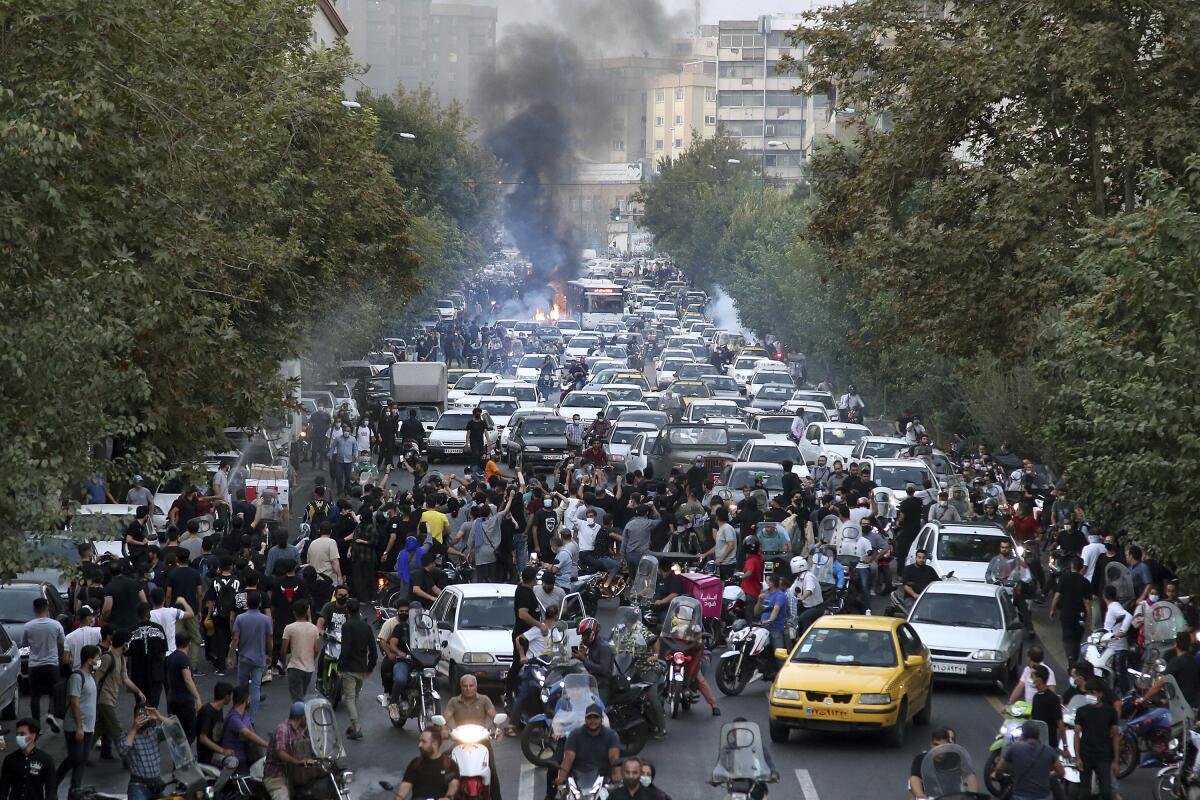Op-Ed: Iranian women are rising up to demand freedom. Are we listening?

- Share via
In recent days, protests have shaken the streets of Iran in response to the killing of 22-year-old Kurdish Iranian Mahsa (Zhina) Amini. Amini died Sept. 16 after being arrested for her “improper hijab” and apparently beaten by Iran’s so-called morality police. Thousands of Iranians are occupying the streets across the country. Led by women, they are rising up and calling for an end to the morality police and the systems that uphold it.
Amini’s death comes amid an intensification of repressive state policies under the Raisi administration that have targeted women in particular. Last month, authorities announced they would aggressively crack down on what they consider violations of hijab rules (requiring modest dress), from showing hair to “bad makeup.” And earlier this month the government announced it will start using facial recognition technology in public spaces to enforce the dress code against women.
In the past week, demonstrators have been chanting “Women, life, freedom,” connecting women’s rights to broader social and economic policies. Many were holding signs saying “death to the oppressor, whether it’s a king or the leader.”
Watching these protests from the United States only weeks after returning from visiting family in Iran, I’m deeply moved and inspired by the thousands of Iranians filling familiar streets, and I’m horrified by the police brutality they are being met with in response. As an Iranian American Muslim woman who chooses to wear the hijab, I am outraged at the way that my identity is being exploited by the Iranian state to maintain power and impose repressive regulations on Iranian women who choose not to wear the hijab.
The Islam I grew up in taught me that faith is a choice. What I see on Iran’s streets today — mandatory hijab being maintained at gunpoint — could not be further from what the government claims to represent. This is not about Islam or enforcing “morality” but about enforcing state power. The 1979 Revolution began as a cry for freedom from a foreign-backed monarchy, but religious slogans and symbols were quickly co-opted to build and maintain another repressive state. The protesters are now demanding that the original promises of the revolution — freedom, independence, social justice — be fulfilled.
Today’s protests echo the decades of resistance led by women, both veiled and unveiled, against the hijab’s co-optation as a tool of repression since its imposition in the 1980s. This struggle is interlinked with similar struggles for women’s liberation globally.
Whether fighting for the right to control our reproductive lives in the United States, the right to life without military occupation in Palestine or Kashmir, or the right to free speech in Saudi Arabia, women are left with few options but to rise up.
This wave of anti-hijab protests is unprecedented in Iranian history, and Iranians have taken the opportunity to broaden their demands for freedom. A huge number of Iranian civil society groups, including teacher collectives, worker unions, reformist political groups and religious clerics, have come out with statements demanding the abolition of the morality police.
The response of American voices, however, remains unsurprisingly retrograde. Former Secretary of State Mike Pompeo, for example, is calling for additional sanctions on Iran, not recognizing the brutal irony in this proposal. Characterizing the current protests as simply about mandatory dress codes erases the larger economic and political contexts that empowered the morality police and ignores the role of the United States in creating these dire economic conditions.
Iran is currently experiencing extreme economic inflation caused largely by U.S. sanctions. The impact of the sanctions is felt the hardest by the most vulnerable segments of society: women, working-class communities and ethnic minorities who struggle to afford basic goods. Cutting the Iranian people off from the world by sanctions also allows the government to monopolize telecommunications and the internet, with the ability to impose severe restrictions on the population.
Not only have sanctions historically failed to weaken the repressive states they are targeting, but they also actually benefit them. Since the 1979 Revolution, U.S. actions have provided fear-mongering opportunities for hardliners to exploit and build power. President Ebrahim Raisi’s election itself can be seen in part as a product of Trump’s military interventions and “maximum pressure sanctions.” As the economy has been squeezed and ordinary people suffer, the Revolutionary Guards and others connected to the government have seized an even bigger share of the national economy, concentrating wealth in their hands.
And yet, despite hardliners and sanctions, these past few days I’ve never been prouder to watch Iranian women standing on cars lighting headscarves on fire, workers and students pouring into the streets, and seeing signs and slogans demanding freedom and liberation for all people.
Women’s rights are under attack globally, and Iranian women are on the frontlines of this battle. We can learn from their courage in standing up in the face of state violence and police brutality. To support their cause, we need to demand an immediate lifting of sanctions (the U.S. lifted some internet technology-related sanctions on Friday) so that they can continue to rise up against oppression in all forms.
Hoda Katebi is an Iranian American writer and community organizer living in Chicago and the Bay Area. @hodakatebi
More to Read
A cure for the common opinion
Get thought-provoking perspectives with our weekly newsletter.
You may occasionally receive promotional content from the Los Angeles Times.










